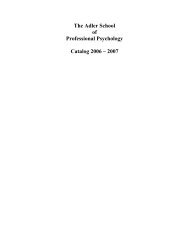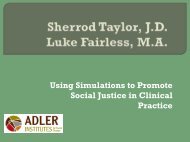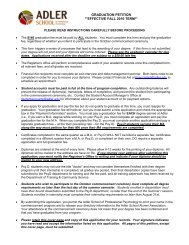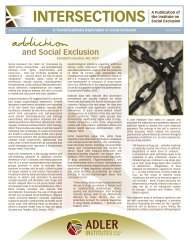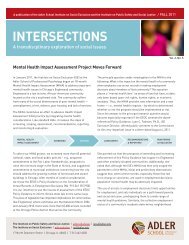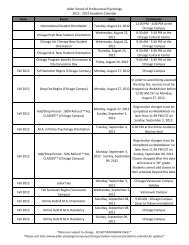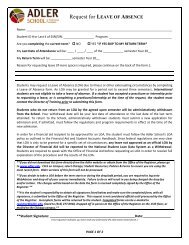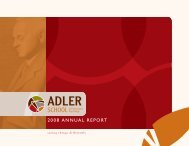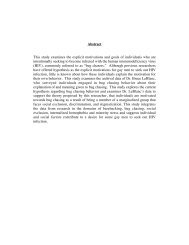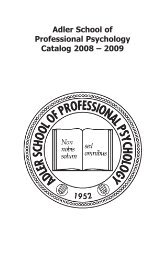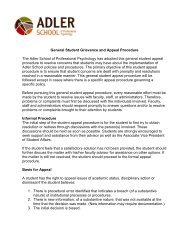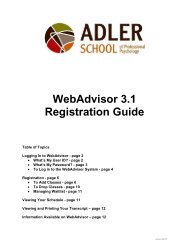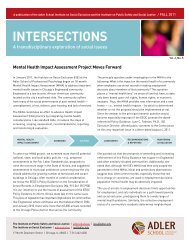Adler School of Professional Psychology 2009 Annual Report
Adler School of Professional Psychology 2009 Annual Report
Adler School of Professional Psychology 2009 Annual Report
You also want an ePaper? Increase the reach of your titles
YUMPU automatically turns print PDFs into web optimized ePapers that Google loves.
<strong>Adler</strong> <strong>School</strong> <strong>of</strong> Pr<strong>of</strong>essional <strong>Psychology</strong> <strong>2009</strong> <strong>Annual</strong> <strong>Report</strong>
It looks like vision,<br />
change, connections,<br />
What does social<br />
responsibility look like<br />
collaboration, diversity,<br />
insight, access,<br />
community, global,<br />
new beginnings, learning,<br />
accomplishment,<br />
growth, support,<br />
leadership, gratitude.<br />
2 2
It looks like <strong>Adler</strong> <strong>School</strong>.<br />
Times <strong>of</strong> pr<strong>of</strong>ound social and cultural change —such<br />
as we are now experiencing —present tremendous<br />
possibility for individuals and institutions that have<br />
the courage to act on a clear and relevant vision.<br />
Economic crisis, burgeoning gaps between rich and<br />
poor, continuing warfare. These challenges require<br />
the type <strong>of</strong> leadership defined by the <strong>Adler</strong> <strong>School</strong>’s<br />
vision <strong>of</strong> social responsibility. The work <strong>of</strong> our <strong>School</strong><br />
is more timely than ever. We face —as individuals,<br />
families, communities, and nations —a host <strong>of</strong><br />
intertwined social challenges that are complex, with<br />
neither a single cause nor a single solution. These<br />
challenges call for a new way <strong>of</strong> seeing, a willingness<br />
to ask difficult questions, an understanding <strong>of</strong><br />
diversity, difference, and disadvantage, and the skills<br />
to generate community-based solutions on multiple<br />
levels and from multiple perspectives.<br />
This is what social responsibility looks like in practice.<br />
We continue to refine our curriculum to ensure it not<br />
only meets, but anticipates, the needs <strong>of</strong> our students,<br />
our pr<strong>of</strong>essions, and the communities we serve. We are<br />
soon moving to a new Chicago campus, an innovative<br />
urban home in which students can make the most <strong>of</strong><br />
our progressive programs. With double our current<br />
space, we will be able to expand those programs,<br />
launch new ones, and further apply <strong>Adler</strong>ian concepts<br />
to modern problems.<br />
In the midst <strong>of</strong> a global economic crisis that is<br />
crippling many venerable institutions, the <strong>Adler</strong><br />
<strong>School</strong> has grown its enrollment and doubled the rate<br />
<strong>of</strong> participation in its alumni giving program.<br />
Our ongoing relevance and success is evident in our<br />
students and graduates, who are equipped by their<br />
classroom and community experiences to take their<br />
place in the world as advocates and leaders. Even as<br />
we reach out to new communities, our roots remain<br />
grounded. As far back as the 1940s, our founder,<br />
Rudolph Dreikurs, worked at Jane Addams’ Hull<br />
House in Chicago. We continue today —in Chicago,<br />
in Vancouver, and throughout the world —in Addams’<br />
words, “with faith in new possibilities and courage to<br />
advocate them.”<br />
Raymond E. Crossman, Ph.D.<br />
President<br />
3 4
It looks like vision.<br />
Transitions inspire reflection. So it has been a year<br />
rich with memories as I’ve prepared to step down<br />
in the coming year from the <strong>Adler</strong> <strong>School</strong> Board <strong>of</strong><br />
Trustees. I have been privileged to serve on the board<br />
since 1997, and to witness the <strong>School</strong>’s remarkable,<br />
transformational progress. We’ve created a new vision,<br />
developed a strategy to see it through, launched<br />
innovative curricula, and opened two new Institutes<br />
for Social Change.<br />
But foremost in my mind are the students, especially<br />
those I’ve met at Commencement over the years.<br />
Students like Seipone Mphele, who left Botswana to<br />
study at the <strong>Adler</strong> <strong>School</strong>, then returned to make a<br />
contribution in her home country. Or Anthony Keany,<br />
a graduate <strong>of</strong> our unique Master <strong>of</strong> Arts in Police<br />
<strong>Psychology</strong> program, who returned to policing with<br />
greater insight and understanding. I have always<br />
believed that if more people had the opportunity to<br />
learn what Alfred <strong>Adler</strong> believed in — and to utilize<br />
that way <strong>of</strong> thinking —it could make a significant<br />
difference in the world.<br />
I’ve seen that potential more fully realized. World<br />
events —including mounting social injustice, and<br />
the irresponsibility that has created a worldwide<br />
financial crisis—have driven the need for the<br />
<strong>School</strong>’s work and its vision <strong>of</strong> social justice. While<br />
external events have made the <strong>School</strong>’s work more<br />
relevant than ever, making an impact takes visionary<br />
leadership —which came to us in the person <strong>of</strong> our<br />
president, Ray Crossman. Ray connected immediately<br />
with what the <strong>School</strong> stood for and then built the right<br />
team to carry it forward.<br />
Under Ray’s leadership, the <strong>Adler</strong> <strong>School</strong> has drawn<br />
the attention <strong>of</strong> powerful partners and strategic allies<br />
like Teamwork Englewood, Heartland Alliance, the<br />
Centers for Disease Control and Prevention, and the<br />
Chicago Police Department. Our work has an impact<br />
that people want to be associated with, which in<br />
turn allows us to have an even greater impact. It’s a<br />
tremendous upward spiral. I leave the board gratified<br />
by our accomplishments, and with great anticipation<br />
<strong>of</strong> things to come. The vision flourishes and the spiral<br />
soars higher. I see the chair I now leave as a coveted<br />
position among those who are committed to serious<br />
worldwide change.<br />
And mostly, I see the students —a richly diverse<br />
learning community uniting people <strong>of</strong> all ages, races,<br />
nationalities, identities, and abilities, in the desire<br />
to use their lives well. With the support <strong>of</strong> the <strong>School</strong>’s<br />
leadership, faculty, staff, and alumni, they will be<br />
able to accomplish things beyond what I can even<br />
dream <strong>of</strong> today.<br />
Patricia Moten Marshall, M.H.A.<br />
Chair, Board <strong>of</strong> Trustees<br />
5<br />
6
It looks like change.<br />
Gun violence shreds the social fabric <strong>of</strong> Chicago’s Englewood community. If you<br />
ask people in the neighborhood, they’ll tell you that the problem starts with a lack<br />
<strong>of</strong> understanding, that the community’s youth don’t comprehend the devastating<br />
consequences <strong>of</strong> gun violence.<br />
Art journal selections created by the <strong>Adler</strong> <strong>School</strong>’s Gun Violence Project participants.<br />
If you ask, they’ll also tell you their ideas for solving the problem. Ask. Listen. Respond.<br />
That’s exactly what Lynn Todman, Ph.D., Director <strong>of</strong> the <strong>Adler</strong> <strong>School</strong>’s Institute on<br />
Social Exclusion (ISE), did. The folks at Teamwork Englewood, a community-based<br />
organization, sought out Dr. Todman to assist them in addressing community safety<br />
needs. When asked, they suggested the use <strong>of</strong> art as one solution. What resulted was<br />
the Gun Violence Prevention Project, a pilot Summer <strong>2009</strong> program funded by the<br />
Field Foundation <strong>of</strong> Chicago.<br />
The ISE, supported by the <strong>School</strong>’s Art Therapy program, designed and launched<br />
the collaborative program with the staff <strong>of</strong> Teamwork Englewood and two practicing<br />
community-based artists. Every Friday afternoon for eight weeks throughout the<br />
summer, more than 20 young men, ranging in ages from 13 to 17, participated in<br />
the program. Through activities such as journaling and the creation <strong>of</strong> a piece <strong>of</strong><br />
community art —a mural that conveys an anti-gun violence message —the young men<br />
processed their experiences.<br />
And, while the program’s participants benefited, so did the <strong>Adler</strong> <strong>School</strong> students.<br />
They gained hands-on experience with the use <strong>of</strong> art as a tool for understanding and<br />
healing. They also gained direct insights into the challenges and the rewards <strong>of</strong> working<br />
in communities with extraordinary needs.<br />
The Gun Violence Prevention Project illustrates social responsibility in action. Ask.<br />
Listen. Respond. Instead <strong>of</strong> telling Englewood what it needed, the ISE utilized the<br />
community’s intrinsic strength and wisdom. It is representative <strong>of</strong> the way the <strong>School</strong><br />
and its Institutes work for change with and in communities.<br />
7<br />
8
It looks like connections.<br />
The gun violence that plagues Chicago neighborhoods like Englewood isn’t quarantined;<br />
it’s a problem urban communities across the country are forced to confront. The root<br />
causes and the solutions for a problem as pandemic as gun violence are as diverse as the<br />
urban landscapes they affect, but there are dots to be connected.<br />
The <strong>Adler</strong> <strong>School</strong>’s Institute on Public Safety and Social Justice (IPSSJ) is forging those<br />
connections, acting as a hub for dialogue and innovation to address complex social<br />
issues like gun violence.<br />
Laura Kunard, Ph.D., Director <strong>of</strong> the IPSSJ, is working to develop a network <strong>of</strong> nationally<br />
respected experts, bringing together policy makers, students, academics, and members<br />
<strong>of</strong> the broader public to develop deeper understanding <strong>of</strong> the community-oriented efforts<br />
that are working.<br />
In the IPSSJ’s first year, Dr. Kunard has already succeeded in drawing to the Institute<br />
notable law enforcement and criminal justice figures like Assistant U.S. Attorney<br />
M. David Weisman, Georgetown University Law Center Pr<strong>of</strong>essor David Cole, and<br />
Cook County Sheriff Tom Dart.<br />
“The traction we’ve gained in only our first year is a testament to the strength <strong>of</strong> the <strong>Adler</strong><br />
<strong>School</strong> mission,” says Dr. Kunard. “There is a very real need to balance public safety<br />
with social justice. We look forward to building on the relationships, both nationally and<br />
in our own community, that will allow us to foster that balance.”<br />
9 10
It looks like collaboration.<br />
The point <strong>of</strong> the <strong>Adler</strong> <strong>School</strong>’s first-<strong>of</strong>-its-kind curriculum is to train socially<br />
responsible practitioners. But what does that look like And how does the <strong>School</strong><br />
ensure it is achieved in practice, not just in fine sounding rhetoric<br />
Josefina Alvarez, Ph.D., who directs the <strong>School</strong>’s Psy.D. program, and a core team<br />
<strong>of</strong> other faculty members are collaborating to make sure that answers to those<br />
questions are spelled out clearly —for both students and faculty. Throughout the past<br />
year, Dr. Alvarez and Frank Gruba-McCallister, Ph.D., Lynn Todman, Ph.D., Sherrod<br />
Taylor, J.D., Laura Kunard, Ph.D., Nancy Slater, Ph.D., and Brian Price, Ph.D.,<br />
rigorously examined what the <strong>School</strong> means by competence in social responsibility,<br />
and what is expected <strong>of</strong> students to demonstrate that competence. The result —in<br />
academic terms—is a curriculum strengthened by a new clarification <strong>of</strong> the specific<br />
knowledge, skills, and attitudes that students must possess by the time they<br />
complete their degrees.<br />
The bigger result—in human terms—is that students are provided with a learning<br />
experience that fosters a transformation in how they see themselves as practitioners.<br />
Faculty also are provided with a deliberate framework to guide students toward new<br />
perspectives on psychology, including the importance <strong>of</strong> seeing individuals within<br />
the context <strong>of</strong> their communities, and <strong>of</strong> using intervention strategies and advocacy<br />
skills to change larger social systems.<br />
“It is a tremendous privilege to witness the transformation in students as they move<br />
through the curriculum,” says Dr. Alvarez. “I see students whose whole approach<br />
to psychology, and the way they see themselves as pr<strong>of</strong>essionals, is ignited by what<br />
they experience here.”<br />
11<br />
12
It looks like diversity.<br />
The <strong>Adler</strong> <strong>School</strong>’s commitment to social responsibility extends worldwide, and<br />
core faculty members Kristin Velazquez Kenefick, Psy.D., and Vida Dyson, Ph.D, help<br />
ensure that students get to experience this through programs and classes that<br />
transcend borders.<br />
The newest opportunity uses Skype videoconferencing to bring students into the work<br />
<strong>of</strong> Mujeres Enlazadas, an organization that serves women and adolescent girls in the<br />
remote town <strong>of</strong> Patzcuaro, Mexico.<br />
“Our students talk directly to the people involved —they ask questions, share<br />
ideas, and partner in a very direct way. This creates the kind <strong>of</strong> dialogue that lets<br />
our students really understand what’s going on in community health issues.”<br />
Kristin Velazquez Kenefick, Psy.D., core faculty<br />
Debuting in fall <strong>2009</strong> to full enrollment, the course is called “International<br />
Consultation on Women’s Issues.” It gives students hands-on experience providing<br />
assessment on mental health needs that emerge as medical staff provide physical<br />
care to women. In a healthcare system that focuses solely on physiological aspects<br />
<strong>of</strong> health, issues such as depression in women who have experienced physical<br />
abuse typically go unrecognized and untreated. Mujeres Enlazadas is working to<br />
empower women as self-advocates in a healthcare system that is ill equipped to<br />
address their needs.<br />
“Our goal is to integrate mental health screening with the physical health services that<br />
are provided to women in this rural community,” says Dr. Dyson.<br />
The class is one outcome <strong>of</strong> a partnership between the <strong>Adler</strong> <strong>School</strong> and the Heartland<br />
Alliance, which is headquartered in Chicago and works with people in extreme poverty<br />
and danger all over the world. To provide students with the experience <strong>of</strong> direct<br />
involvement, the <strong>School</strong> uses Skype’s technology to consult with the organization live<br />
throughout the school year.<br />
Students who are interested in hands-on work abroad also have the opportunity to<br />
do so via other course <strong>of</strong>ferings, such as the International and Cross-Cultural Studies<br />
course, during which students spend two weeks in Costa Rica working at a service<br />
learning program. International experiences like these give students first-hand<br />
exposure to the impact <strong>of</strong> systematic barriers on health and well-being in various<br />
cultures abroad.<br />
13<br />
14
It looks like insight.<br />
Picture the practice <strong>of</strong> clinical psychology in a whole new light. Erin Watson does.<br />
That is one big reason she came to the <strong>Adler</strong> <strong>School</strong> to earn her Doctorate in Clinical<br />
<strong>Psychology</strong>. She wanted a broad range <strong>of</strong> pr<strong>of</strong>essional options, and the concrete skills<br />
and training to positively affect not just individuals, but their communities, too.<br />
She also “hears” her clients differently, through sign language. Now in her second<br />
year <strong>of</strong> the <strong>School</strong>’s Psy.D. program, Watson is doing a clinical practicum at<br />
Mental Health & Deafness Resources, Inc., a hospital-based psychiatric program<br />
in Des Plaines, Illinois. It is an ideal environment for Watson, whose pr<strong>of</strong>essional<br />
concentration is in primary care, which means that she is being trained to work with<br />
medical teams to treat the mental health issues that <strong>of</strong>ten are identified in<br />
medical settings.<br />
She works with the program’s nurses, and staff psychologists and psychiatrists, to<br />
assess the mental health needs <strong>of</strong> patients between the ages <strong>of</strong> 5 and 23, using<br />
methods like diagnostic interviews and a range <strong>of</strong> tests such as personality, cognitive,<br />
and neurological assessments.<br />
Equally valuable to her clinical training has been the “milieu time” that she gets to<br />
spend with patients in the inpatient unit’s common areas, doing things like signing<br />
back and forth, helping them with homework, and playing catch or board games. “That<br />
time is invaluable in allowing me to see how a client really is on a moment-to-moment<br />
basis,” says Watson.<br />
“I really love that the <strong>School</strong> emphasizes the need to go beyond the<br />
classroom, beyond therapy sessions, to address the social responsibility<br />
that we have, not just as psychologists, but as human beings.”<br />
She is on track to graduate in 2013, and when she does, it will be with a thorough<br />
grounding in academic, clinical, and social responsibility training. Watson meets every<br />
week with her clinical practicum advisor, Nataka Moore, Psy.D., Director <strong>of</strong> Training<br />
and Community Service, and with a class <strong>of</strong> her fellow Psy.D. students. Dr. Moore not<br />
only oversees Watson’s clinical training, but ensures that the practical and pr<strong>of</strong>essional<br />
insights Watson and her peers are gaining are shared and integrated with their<br />
academic work. “I leave every class excited, because I’m always learning something<br />
new,” says Watson.<br />
Erin Watson, Psy.D. student<br />
15<br />
16
It looks like access.<br />
Online access. These two words are shaping new directions in the <strong>Adler</strong> <strong>School</strong><br />
programs and courses available to students. Don Sorsa, the <strong>School</strong>’s Director<br />
<strong>of</strong> Online Learning, has helped guide the development <strong>of</strong> courses that incorporate<br />
online studies since 2008.<br />
“We could have purchased existing online courses,” says Sorsa, “but we didn’t do<br />
that. Instead, we’re growing our online <strong>of</strong>ferings from the ground up so they<br />
are distinctive to our <strong>School</strong>. Rather than throwing in social responsibility as an<br />
add-on component, we have expert <strong>Adler</strong> <strong>School</strong> faculty who design the courses,<br />
building in our social responsibility curriculum so that it is an intrinsic part <strong>of</strong><br />
the course structure.”<br />
Since Summer 2008, more than 350 students at the <strong>Adler</strong> <strong>School</strong> have enrolled<br />
in one or more <strong>of</strong> the <strong>School</strong>’s 22 different online or blended courses.<br />
Most recently, Sorsa helped launch the <strong>School</strong>’s first full degree program that blends<br />
a residential component with online courses. The blended format Master <strong>of</strong> Arts<br />
in Counseling <strong>Psychology</strong> <strong>of</strong>ficially launched in January <strong>2009</strong>, with a full enrollment<br />
<strong>of</strong> 19 students.<br />
This comprehensive program allows working pr<strong>of</strong>essionals to complete their graduate<br />
degree in three years. The coursework is rigorous. It starts with a two-day, intensive<br />
residential period on campus to meet with faculty and the student group that will<br />
study together throughout the program. They continue to interact online with faculty<br />
and their fellow students, coming together in person three weekends each year.<br />
Sorsa says the mid-term feedback shows that the intensity <strong>of</strong> the <strong>School</strong>’s online<br />
courses, and the learning communities they build among students, are as rewarding<br />
as they are demanding. “No one feels alone in their studies,” says Sorsa. “There is<br />
a great deal <strong>of</strong> student-to-student and student-to-faculty interaction.”<br />
17 18
It looks like community.<br />
This past year the <strong>Adler</strong> <strong>School</strong> senior management team traveled to Benton Harbor,<br />
Michigan, for a one-week community service project — the same kind <strong>of</strong><br />
community service required <strong>of</strong> all <strong>of</strong> the <strong>School</strong>’s students. It was far more than a<br />
feel-good volunteer experience. Just as student Community Service Practicum (CSP)<br />
experiences have specific learning goals, so did this leadership project.<br />
The idea for the project —suggested by the <strong>School</strong>’s faculty—was embraced as<br />
a great way to “walk the talk” and model social responsibility in action by providing<br />
services and support to Benton Harbor, a community located just more than 100<br />
miles outside Chicago, with a deep history <strong>of</strong> racial conflict and economic disparity.<br />
Fewer than five percent <strong>of</strong> residents have a bachelor’s degree, and unemployment<br />
stands at over 16 percent.<br />
Heartland Alliance, a valuable community partner to the <strong>Adler</strong> <strong>School</strong>, provided the<br />
project setting with its Opportunity Center, a community resource that opened its<br />
doors in 2007 to provide basic vocational and employment behavioral skills support<br />
to residents.<br />
The <strong>Adler</strong> <strong>School</strong>’s senior management team <strong>of</strong> seven key <strong>School</strong> leaders from Chicago<br />
and Vancouver helped assess and redesign the Center’s services, and rebuilt the<br />
lobby and community classroom <strong>of</strong> Mercy Center, in which the Opportunity Center<br />
is housed. The participants found that by simulating what is asked <strong>of</strong> all <strong>Adler</strong> <strong>School</strong><br />
students, the experience validated that the <strong>School</strong>’s curriculum approach— asking<br />
students to get engaged in communities, and to reflect on the experience —produces<br />
insights that cannot be gained in any other way.<br />
“It was deeply rewarding to work together as colleagues in a different venue,”<br />
says Jo Beth Cup, Vice President <strong>of</strong> Administration. “We each exhibited skills<br />
and knowledge that we don’t always get the opportunity to use in our regular work<br />
environment, and the experience increased our effectiveness as a team.”<br />
Facing page: Members <strong>of</strong> the <strong>School</strong>’s senior management team (shown at center, row two) work alongside<br />
Opportunity Center staff to assess and redesign services, and to rebuild the lobby and a community classroom.<br />
19<br />
20<br />
20
It looks global.<br />
The <strong>Adler</strong> <strong>School</strong>’s Vancouver Campus continues to expand its horizons in numerous<br />
ways, each aimed at strengthening the <strong>School</strong>’s international presence and meeting<br />
the ever-increasing need for socially responsible practitioners here and abroad. To<br />
keep pace with a growing number <strong>of</strong> students and ongoing curriculum enhancements,<br />
the Campus has expanded its capacity with additional core faculty members and staff.<br />
In addition, the Vancouver Campus leadership set out in 2008 to learn what<br />
international students need, expect, and want from North American graduate programs.<br />
Dean Larry Axelrod, Ph.D., and his team started by asking questions. They gained an<br />
understanding <strong>of</strong> current international student needs, and consulted with immigrant<br />
and resettlement service agencies.<br />
Their aim for this ongoing effort goes beyond exploring opportunities for growth in<br />
international student enrollment, which is particularly great for the Vancouver Campus,<br />
located in a thriving, urban center that has been called the “gateway to Asia.”<br />
The assessment also continues developing the <strong>School</strong>’s strengths in supporting<br />
international students, who make up 17 percent <strong>of</strong> the Fall <strong>2009</strong> Vancouver class.<br />
Training these students as skilled practitioners, who may choose to return to make<br />
contributions in their home countries, increases the <strong>School</strong>’s reach and supports the<br />
growth <strong>of</strong> culturally competent counselling and psychology around the globe.<br />
“We continue to be very deliberate about using training experiences to benefit our<br />
students individually and collectively,” says Dr. Axelrod. “And now, more than ever,<br />
we are intentional about using training to support the development and integration<br />
<strong>of</strong> cultural competencies for all <strong>of</strong> our students.”<br />
21 22
It looks like new beginnings.<br />
Students at the <strong>Adler</strong> <strong>School</strong> are taught to see things differently—including things<br />
like our prison systems. One way they experience this perception shift is through<br />
the Community Service Practicum (CSP), which all students do in their first year <strong>of</strong><br />
study with one <strong>of</strong> the <strong>School</strong>’s 500 community partners.<br />
“To affect meaningful social change you have to address interwoven circumstances,”<br />
says Wendy Paszkiewicz, Psy.D., Interim Vice President <strong>of</strong> Academic Affairs. “That’s<br />
especially true in the area <strong>of</strong> prison reform, an issue that several <strong>of</strong> our students<br />
have addressed through their Community Service Practica. By examining the problems<br />
facing our corrections system from multiple angles, they learn how to intervene<br />
through a range <strong>of</strong> multi-faceted solutions.”<br />
William Mescall and Charmaine Dodd, both Master’s students, recently completed<br />
their CSPs working with the National Alliance Against Racist and Political Repression<br />
to identify situations that amounted to prisoner abuse. Through analysis <strong>of</strong> prisoner<br />
medical records they identified cases <strong>of</strong> deliberate indifference to mental and medical<br />
health issues. Their research has helped to paint a picture <strong>of</strong> the realities <strong>of</strong> neglect<br />
within our prison systems.<br />
Master’s students Nick Fredrick and Joanna Mungal found through their CSPs that<br />
access to basic care and support systems doesn’t improve once prison inmates return<br />
to society. While working with the Illinois Institute for Community Law and Affairs,<br />
Fredrick and Mungal interviewed employers about their perceptions <strong>of</strong> former prison<br />
inmates. Their research helped to define an unfortunate reality: not only are employers<br />
<strong>of</strong>ten unwilling to hire ex-<strong>of</strong>fenders, they’re frequently unwilling even to talk about it.<br />
“The work we did was about eventuality,” says Fredrick. “Without a second chance, a<br />
return to a life <strong>of</strong> crime is a strong possibility. When that happens everyone loses.”<br />
Despite employer reluctance, Fredrick and Mungal did identify important insights on<br />
employment attitudes, and their work could ultimately set the stage for changes in<br />
perception about employing ex-<strong>of</strong>fenders.<br />
It is through the work <strong>of</strong> CSPs like these that students are equipped to see, understand,<br />
and act on social injustice in new ways.<br />
23 24
It looks like learning.<br />
Envision the shared process <strong>of</strong> learning. What does it look like At the <strong>Adler</strong> <strong>School</strong>,<br />
respect for individual difference is balanced with a healthy appreciation for an<br />
individual’s role in the larger community. That core commitment is a hallmark <strong>of</strong> the<br />
<strong>School</strong>’s learning community, and the <strong>Adler</strong>ian values on which we are based.<br />
Representing a full spectrum <strong>of</strong> diversity — in age, gender, ethnicity, culture, sexual<br />
orientation, and other variables — the depth and breadth <strong>of</strong> perspectives embodied<br />
in the <strong>School</strong>’s Board <strong>of</strong> Trustees, faculty, staff, and students, help set the stage for a<br />
genuine exchange <strong>of</strong> ideas. In turn, that exchange makes possible the realization <strong>of</strong><br />
new insights and new applications <strong>of</strong> psychology to contemporary social issues.<br />
Since Fall 2003, the <strong>School</strong>’s enrollment has more than tripled. That dramatic<br />
growth underscores the relevance and timeliness <strong>of</strong> the <strong>Adler</strong> <strong>School</strong>’s mission to train<br />
socially responsible practitioners. In addition, applications to the <strong>School</strong> have<br />
increased nearly three-fold in the past three years. Even as the <strong>School</strong> expands its<br />
resources to keep pace with increasing interest, academic quality standards are ensured<br />
with small class sizes (average student/faculty ratio at the <strong>School</strong> is 12:1) and<br />
selection <strong>of</strong> the most qualified applicants (for example, there are now about four<br />
applications for every seat, and 84 percent <strong>of</strong> the Fall <strong>2009</strong> entering class had<br />
community service experience during undergraduate study).<br />
M.A. in Counseling <strong>Psychology</strong>:<br />
Art Therapy 10%<br />
Certificate/Other 1%<br />
M.A. in Police <strong>Psychology</strong> 7%<br />
Asian/Pacific Islander 4%<br />
Multiracial/<br />
Other 13%<br />
M.A. in Counseling &<br />
Organizational <strong>Psychology</strong> 4%<br />
Hispanic/Latino 7%<br />
M.A. in Marriage &<br />
Family Counseling 6%<br />
M.A. in Counseling<br />
<strong>Psychology</strong> 16%<br />
Doctorate in Clinical<br />
<strong>Psychology</strong> 56%<br />
African-American<br />
11%<br />
White/Caucasian 65%<br />
FAll 2008 STuDEnT<br />
EnROllmEnT By PROgRAm<br />
FAll 2008 STuDEnT<br />
EnROllmEnT By EThnIcITy<br />
25<br />
26
It looks like accomplishment.<br />
Key Strategy Three: Establish the <strong>Adler</strong> Center<br />
Key Strategy Five: Diversify revenue streams<br />
Achievement <strong>of</strong> strategic goals is an established hallmark <strong>of</strong> the <strong>Adler</strong> <strong>School</strong>. Each year, the Board <strong>of</strong> Trustees<br />
sets forth <strong>School</strong> goals to correspond with five Key Strategies and financial aims <strong>of</strong> the <strong>School</strong>’s overall<br />
strategic plan. The past year, the fourth in the <strong>School</strong>’s current five-year plan, has continued this trajectory<br />
<strong>of</strong> accomplishment. Goals set for 2008-09 have been met, paving the way for the ongoing realization, in a<br />
deliberate and strategic manner, <strong>of</strong> the <strong>School</strong>’s vision.<br />
Key Strategy One: Align education programs,<br />
Key Strategy Two: Build a global image and presence<br />
processes, and people with social interest and social<br />
responsibility<br />
Goal Met: Assessed international student participation<br />
and success, and established targets for recruitment<br />
Goal Met: Launched first online/blended degree efforts to realize new academic year 2010 Vancouver<br />
program in Winter <strong>2009</strong>.<br />
Campus enrollments.<br />
In January <strong>2009</strong>, 19 students enrolled in the new The Vancouver Campus has completed an international<br />
Masters in Counseling <strong>Psychology</strong> program—delivered assessment and decided to focus in the coming year<br />
through an online/residential blended format and on student recruitment in India, through relationships<br />
designed for working pr<strong>of</strong>essionals. More than 350 with provincial, federal, and private organizations,<br />
students have completed an online or blended course and admissions visits to India. In addition, the<br />
since Summer 2008, and the <strong>School</strong> continues to Vancouver Campus received consent from British<br />
explore expanded program opportunities through Columbia’s Ministry <strong>of</strong> Education to launch a Master <strong>of</strong><br />
online learning formats.<br />
Arts in Organizational <strong>Psychology</strong> in January 2010.<br />
Goal Set: Looking ahead we will launch two new Goal Set: We will launch one new academic program<br />
academic programs in Chicago during <strong>2009</strong>-10. in Vancouver during <strong>2009</strong>-10.<br />
Goal Met: Secured and developed plans for new<br />
Chicago Campus facility.<br />
In 2008-<strong>2009</strong>, the <strong>School</strong>’s Board approved<br />
acquisition <strong>of</strong> a new campus space in the Chicago<br />
Loop. The new space will not only double our campus<br />
size to 101,000 square feet, the move also will<br />
give the <strong>School</strong> a dedicated street-level entrance,<br />
ground-floor lobby space, and two upper floors.<br />
The new campus, designed by the firm OWP/P, will<br />
provide a progressive new home for the <strong>Adler</strong> <strong>School</strong>’s<br />
faculty, staff, and students as <strong>of</strong> December 2010.<br />
Goal Set: We will develop the new Chicago Campus<br />
facility during FY10 for our move in December 2010.<br />
Key Strategy Four: Create multi-disciplinary<br />
partnerships and alliances<br />
Goal Met: Established one new partnership that<br />
generates new revenues and stimulates new academic,<br />
service, or research activity through <strong>Adler</strong> Community<br />
Health Services.<br />
The <strong>School</strong> works with approximately 500 partners<br />
to provide educational and training experiences for<br />
students and to engage communities through health<br />
services, advocacy, and other forms <strong>of</strong> assistance.<br />
During 2008-09, two significant new partnerships were<br />
established: with Teamwork Englewood, a community<br />
development organization in the predominantly<br />
African-American community <strong>of</strong> Englewood, and with<br />
Heartland Alliance, an international social justice<br />
advocacy and service organization.<br />
Goal Set: We will establish at least one new high-impact<br />
partnership during <strong>2009</strong>-10.<br />
Goal Met: Doubled alumni donor participation rate from<br />
2 to 4 percent.<br />
With the support <strong>of</strong> an active <strong>Adler</strong> <strong>School</strong> Alumni<br />
Association, alumni participated this past year in two<br />
educational programs, four social and pr<strong>of</strong>essional<br />
gatherings, and a planned community service project.<br />
Alumni also continued to demonstrate their financial<br />
support, more than doubling their participation in giving<br />
to the <strong>School</strong>, to 72 alumni donors this past year from<br />
34 the previous year.<br />
Goal Set: We will increase alumni donor participation<br />
from 4 to 7 percent during <strong>2009</strong>-10.<br />
Financial Goals<br />
Goal Met: Revenue grew 20 percent over the previous<br />
year’s (FY08) budgeted revenues.* While this is just shy<br />
<strong>of</strong> the <strong>School</strong>’s goal for 2008-09 <strong>of</strong> 25 percent revenue<br />
growth, it is a strong achievement in the context <strong>of</strong> a<br />
pervasive global economic crisis.<br />
Goal Set: During <strong>2009</strong>-10, we will grow revenues<br />
25 percent over FY09 revenues.<br />
Goal Met: Change in net assets was 50 percent greater<br />
than the previous year’s (FY08) budgeted change in net<br />
assets.* Perhaps even more significant than achievement<br />
<strong>of</strong> the established goal is the cumulative effect <strong>of</strong> this<br />
growth. During the past six years, the <strong>School</strong>’s net assets<br />
have grown by a remarkable 250 percent.<br />
Goal Set: During <strong>2009</strong>-10 we will grow change in net<br />
assets by 33 percent over FY09 change in net assets.<br />
* Numbers are unaudited<br />
27<br />
28
PROJECTED<br />
PROJECTED<br />
It looks like growth.<br />
29%<br />
20.0<br />
24%<br />
4.6<br />
8% growth<br />
5.0<br />
6.8<br />
37%<br />
8.3<br />
22%<br />
10.7<br />
28%<br />
13.8<br />
29%<br />
12%<br />
15.4<br />
Vancouver<br />
% growth<br />
74<br />
Chicago<br />
% growth<br />
366<br />
25%<br />
1% 169<br />
19%<br />
135<br />
11%<br />
134<br />
20%<br />
11%<br />
27%<br />
21%<br />
113<br />
94<br />
27%<br />
4%<br />
463 481 581 642 712<br />
1.2<br />
16% growth<br />
1.4<br />
2.0<br />
46%<br />
2.3<br />
12%<br />
2.7<br />
19%<br />
3.6<br />
30%<br />
4.1<br />
14%<br />
5.1<br />
.9 .8 1.0 1.1 1.2 1.2 1.1 1.2<br />
FY03 FY04 FY05 FY06 FY07 FY08 FY09 * FY10<br />
FALL 04 FALL 05 FALL 06 FALL 07 FALL 08 FALL 09 *<br />
FY03 FY04 FY05 FY06 FY07 FY08 FY09 * FY10<br />
Amount in millions<br />
Capital investments<br />
Capital expenditures<br />
Chicago<br />
Vancouver<br />
Amount in millions<br />
Investment Assets<br />
Ending Assets<br />
Revenues expanded.<br />
Improvements were made.<br />
Enrollment increased.<br />
Assets climbed.<br />
Revenues reached a record $15.4 million in<br />
Meanwhile, the <strong>School</strong> made approximately<br />
The <strong>Adler</strong> <strong>School</strong> continues its trajectory <strong>of</strong><br />
Net assets climbed to $4.1 million in 2008-09, up<br />
2008-09, up 12 percent over the previous year<br />
$400,000 in capital expenditures in 2008-09, as<br />
growth. Enrollment at the Chicago and Vancouver<br />
14 percent over the previous year and up 49 percent<br />
and up 44 percent since 2006-07.<br />
part <strong>of</strong> $3.4 million in capital investments in the<br />
campuses reached a total <strong>of</strong> 881 students in<br />
since 2006-07.<br />
*<br />
Numbers are unaudited<br />
<strong>School</strong> over the past six years.<br />
Fall <strong>2009</strong>, up 13 percent over the previous year,<br />
*<br />
Numbers are unaudited<br />
*<br />
Numbers are unaudited<br />
and up more than 48 percent since Fall 2006.<br />
29<br />
30
It looks like support.<br />
Now in its fourth year, the <strong>Adler</strong> <strong>School</strong>’s social responsibility curriculum is<br />
drawing increasingly strong support, both from within and beyond the<br />
<strong>School</strong>’s learning community. Overall annual giving increased this past year<br />
by 62 percent, alumni donor participation more than doubled, and the <strong>School</strong><br />
exceeded its overall goals by 23 percent for alumni, staff, and faculty giving.<br />
While the numbers demonstrate success, they cannot adequately convey their<br />
deeper significance.<br />
“We have made fantastic strides during the most challenging <strong>of</strong> times,” says<br />
Anthony Chimera, Vice President <strong>of</strong> Development. “Our success is a testimony<br />
to the faith and confidence that our supporters continue to place in the value<br />
<strong>of</strong> this <strong>School</strong>’s work.”<br />
There is strength, energy, and stability in the community that is developing in<br />
support <strong>of</strong> the <strong>Adler</strong> <strong>School</strong>’s vision. And as the vision strengthens and advances,<br />
so too does the foundation <strong>of</strong> support from alumni and friends. That momentum<br />
is sure to continue.<br />
• Total number <strong>of</strong> individual donors up 92 percent from previous year<br />
• Total alumni giving up 26 percent from previous year<br />
• Newly launched faculty and staff giving program achieved 29 percent<br />
participation, surpassing the national higher education mean<br />
• New <strong>of</strong>fice <strong>of</strong> corporate and foundation relations generated grants at<br />
44 percent <strong>of</strong> development revenue<br />
Scholarship 1% Birdie Mosak Fund 1%<br />
Associations/<br />
Organizations 1% Special Events 2%<br />
Alumni 11%<br />
<strong>Adler</strong> Community<br />
Health Services 19%<br />
IPSSJ 1%<br />
<strong>Annual</strong> 54%<br />
Foundations/<br />
Corporations 44%<br />
Friends/<br />
Parents 18%<br />
ISE 24%<br />
Trustees/<br />
Former Trustees<br />
18%<br />
Faculty/Staff 6%<br />
Total Giving by fund use<br />
Total Giving by Source<br />
31 32
It looks like leadership.<br />
It looks like gratitude.<br />
BOARD OF TRuSTEES<br />
lee guthrie, m.B.A., m.l.S.<br />
AlumnI ASSOcIATIOn<br />
With sincere gratitude the <strong>Adler</strong> <strong>School</strong> proudly presents the following list <strong>of</strong><br />
Sandra Fallon<br />
Yolanda Peppers<br />
Audra Akins, m.A.T.D.<br />
Training Manager<br />
National PTA<br />
mary cahillane, m.B.A.<br />
Chief Financial & Administrative Officer<br />
The Spencer Foundation<br />
Janet campbell, m.S.W.<br />
Regional Child & Youth Mental Health<br />
Coordinator<br />
Ministry <strong>of</strong> Children & Family Development<br />
<strong>of</strong> British Columbia, Canada<br />
Raymond E. crossman, Ph.D.<br />
President<br />
<strong>Adler</strong> <strong>School</strong> <strong>of</strong> Pr<strong>of</strong>essional <strong>Psychology</strong><br />
Victoria chou, Ph.D.<br />
Dean <strong>of</strong> the College <strong>of</strong> Education<br />
University <strong>of</strong> Illinois at Chicago<br />
Ralph E. DeWitt, m.P.A.<br />
Chief, Investigations Bureau<br />
Cook County State’s Attorney’s Office<br />
Diane Dinkins-carr<br />
Founder and President<br />
DD Consulting Group, Inc.<br />
William W. greaves, Ph.D.<br />
Director/Community Liaison<br />
Advisory Council on Gay and<br />
Lesbian Issues<br />
City <strong>of</strong> Chicago – Commission on<br />
Human Relations<br />
Vice President, Marketing & Business<br />
Development<br />
Healthcare Financial Mgmt. Assn.<br />
James houlihan<br />
Cook County Assessor<br />
Steven Kirn, Ph.D.<br />
President and CEO<br />
Steven Kirn Consulting<br />
David J. Kreischer, m.A.<br />
Principal<br />
Higgins, Kreischer and Associates<br />
Patricia moten marshall, m.h.A.<br />
President<br />
SynerChange Chicago<br />
harold mosak, Ph.D.<br />
Faculty<br />
<strong>Adler</strong> <strong>School</strong> <strong>of</strong> Pr<strong>of</strong>essional<br />
<strong>Psychology</strong><br />
Stephanie neely<br />
Treasurer<br />
City <strong>of</strong> Chicago<br />
lindsay Setzer<br />
Retired Director<br />
The Maples Adolescent Treatment Centre<br />
Bernard Shulman, m.D.<br />
Retired Trustee<br />
Javier ubarri, m.B.A.<br />
Former Regional Executive<br />
Banco Popular North America<br />
carolyn Williams meza, m.B.A.<br />
Former Chief Administrative Officer<br />
United Way for Southeastern Michigan<br />
lEADERShIP BOARD<br />
michael Banghart<br />
Master <strong>of</strong> Arts in Counseling <strong>Psychology</strong><br />
2002<br />
Dennis connelly<br />
Master <strong>of</strong> Arts in Police <strong>Psychology</strong><br />
2006<br />
laura mathis<br />
Doctorate in Clinical <strong>Psychology</strong><br />
2004<br />
nadia Pershad<br />
Doctorate in Clinical <strong>Psychology</strong><br />
2003<br />
yael Ron<br />
Doctorate in Clinical <strong>Psychology</strong><br />
2004<br />
mike c. Rooney<br />
Doctorate in Clinical <strong>Psychology</strong><br />
1996<br />
gregory Sarlo<br />
Doctorate in Clinical <strong>Psychology</strong><br />
1999<br />
Ellen mcgury Stone<br />
Doctorate in Clinical <strong>Psychology</strong><br />
2002<br />
DESIGN Kym Abrams Design PhOTOgRAPhy Charlie Simokaitis, Dan Merlo, Corbis, Getty Images PRInTIng UniqueActive This annual report is printed on recycled paper.<br />
benefactors for fiscal year <strong>2009</strong>. This report celebrates the generosity <strong>of</strong> our many<br />
alumni, foundation and corporate partners, and community friends from September 1,<br />
2008 through August 31, <strong>2009</strong>.<br />
We thank you for your financial support, which makes it possible for the <strong>Adler</strong> <strong>School</strong> to<br />
pursue its vision for social justice through various avenues, and to continue developing<br />
socially responsible graduates who value community service, diversity, collaboration,<br />
and holistic approaches to social innovation.<br />
If your name has been omitted or misspelled, please contact Lisa McCaskill, Manager<br />
<strong>of</strong> Development Services at 312-201-5900 x384 or Lmccaskill@adler.edu so we can<br />
make the correction. Thank you.<br />
TRuSTEES’ cIRclE<br />
SuSTAInER<br />
Laura Kunard<br />
$10,000 and above<br />
$250 – $499<br />
John and Nancy Kuykendall<br />
Banco Popular Foundation William Greaves<br />
Katherine A. Lux<br />
Field Foundation <strong>of</strong> Illinois Rob and Marian Gushurst<br />
George Maltezos<br />
Asma Sabbagha<br />
Lee Guthrie<br />
John E. Mayer<br />
Cameron W. Meredith<br />
Steven and Katrine Kirn<br />
PRESIDEnT’S cIRclE<br />
Arthur Nikelly<br />
David J. Kreischer<br />
$5,000 – $9,999<br />
Anthony J. Palo<br />
James Mathisen<br />
Raymond E. Crossman<br />
Meghan Rivard<br />
Wendy Paszkiewicz<br />
FEllOWS’ cIRclE<br />
Jacqueline Rondeau<br />
Miriam J. Roland<br />
$2,500 – $4,999<br />
Frank E. Taylor<br />
Lindsay Setzer<br />
Marilyn T. Smith<br />
Willard B. Brown<br />
Carolyn Williams-Meza<br />
Javier F. Ubarri<br />
Bernard H. Shulman<br />
Xichel A. Woods<br />
Leonard Weitzman<br />
ASSOcIATE<br />
Donald R. Welti<br />
SchOlARS’ cIRclE<br />
$100 – $249<br />
Shawn West<br />
$1,500 – $2,499<br />
Michael Banghart<br />
Nike B. Whitcomb<br />
Audra R. Akins<br />
Dan Barnes<br />
Bradford L. Woods<br />
Jeffrey J. Green<br />
Mark Bilkey<br />
Midori Yamada<br />
Spencer Foundation<br />
Dennis E. Boike<br />
FRIEnD<br />
Timothy C. Sullivan<br />
Janet Campbell<br />
$25 – $99<br />
PATROn<br />
Cynthia A. Cassidy<br />
Magdalini Agrafiotoa<br />
$500 – $1,499<br />
Mary Elizabeth Corcoran<br />
Nancy M. Andrews<br />
Cristina Cox<br />
Robert T. Baker<br />
Jo Beth Cup<br />
Elena Anzalone<br />
Eugene Birmingham<br />
Gail Cutler<br />
Clara Barranco<br />
Mary J. Cahillane<br />
Dan R. Dalton<br />
Bernadette C. Beasley<br />
Anthony C. Chimera<br />
Phyllis DeMark<br />
Karon Bernstein<br />
Vicki Chou<br />
James A. Demcak<br />
Michelle Brice<br />
Diane Dinkins-Carr<br />
Paul Fitzgerald<br />
Charles A. Brudo<br />
Ted Grady<br />
Samuel J. Fletcher<br />
Kathleen Byrne<br />
Frank Gruba-McCallister<br />
William Foege<br />
Arthur Clark<br />
Ellen McGury Stone<br />
Bernd Gaubatz<br />
Kerry Cochrane<br />
Patricia Moten Marshall<br />
Robert Gellman<br />
Dennis J. Connelly<br />
John Sanders<br />
Terrence W. Glarner<br />
Nancy C. Davis<br />
Paul G. Schneider<br />
Barbara Greenham-Conway<br />
Sheryl Davis-Kahn<br />
Judy Sutherland<br />
Susan D. Hagen<br />
Renee Dushman<br />
Lynn Todman<br />
Ileana R. Handoreanu Nesbitt<br />
Joseph Hart<br />
Frederic W. Cook & Co., Inc.<br />
Marilyn Freifeld<br />
Roy Godes<br />
Jane Griffith and<br />
Robert L. Powers<br />
<strong>Adler</strong>ian <strong>Psychology</strong><br />
Association<br />
Christopher L. Grunow<br />
Jane S. Hawley<br />
Gerald M. Hilfiker<br />
Kay L. Kummerow<br />
Catherine Lafitte<br />
Barney L. Lane<br />
James Lemonides<br />
Audrey Linnes<br />
Leo Lobl<br />
Brenda Nagel<br />
Dennis Niswonger<br />
Mitzi C. Norton<br />
Theresa Okunowski<br />
Robert J. Pavelchik<br />
Joseph Pellegrino<br />
Jean C. Robbins<br />
Barbara Ronis<br />
Miceal Rooney<br />
James Rust<br />
Eve Sevack<br />
Eileen Shapero<br />
Kenneth A. Smith<br />
Don Sorsa<br />
Sharon Stubblefield<br />
David Superstein<br />
Alfred M. Thomas<br />
Peter Varda<br />
Auguste Wawer<br />
Ken L. Weaver<br />
Jerry Westermeyer<br />
William White<br />
DOnOR<br />
$25 and under<br />
Mark Aghakhan<br />
Paul Avram<br />
Lawrence Casey<br />
William Curlette<br />
Eileen Glenn<br />
Katherine Kopsky<br />
Sherry Kostman<br />
Lisa McCaskill<br />
Corey Nigro<br />
Victoria Pollock<br />
Elizabeth Puls-Jager<br />
Francine Reed<br />
Francisco Rodriguez<br />
In mEmORIAm<br />
In Memory <strong>of</strong> Valerie Glarner<br />
Terrence W. Glarner<br />
In Memory <strong>of</strong> Birdie Mosak<br />
Leonard Weitzman<br />
In Memory <strong>of</strong> Bina Rosenberg<br />
Joseph Hart<br />
In hOnORARIum<br />
In Honor <strong>of</strong> Keith Christie<br />
Jacqueline Rondeau<br />
In Honor <strong>of</strong> Rudolf Dreikurs<br />
Willard B. Brown<br />
In Honor <strong>of</strong> Harold Mosak<br />
Phyllis DeMark<br />
Timothy C. Sullivan<br />
FAculTy & STAFF<br />
cOnTRIBuTORS<br />
Robert T. Baker<br />
Dan Barnes<br />
Mark Bilkey<br />
Michelle Brice<br />
Anthony C. Chimera<br />
Kerry Cochrane<br />
Cristina Cox<br />
Raymond E. Crossman<br />
Jo Beth Cup<br />
Nancy C. Davis<br />
Paul Fitzgerald<br />
Robert Gellman<br />
Jeffrey J. Green<br />
Frank Gruba-McCallister<br />
Katherine Kopsky<br />
Laura Kunard<br />
Katherine A. Lux<br />
Lisa McCaskill<br />
Mitzi C. Norton<br />
Wendy Paszkiewicz<br />
Francine Reed<br />
Meghan Rivard<br />
Don Sorsa<br />
Lynn Todman<br />
Shawn West<br />
Jerry Westermeyer<br />
33<br />
34
Chicago Campus<br />
65 East Wacker Place<br />
Suite 2100<br />
Chicago, IL 60601-7298<br />
p. 312.201.5900<br />
f. 312.201.5917<br />
admissions@adler.edu<br />
Vancouver Campus<br />
1090 West Georgia Street<br />
Suite 1200<br />
Vancouver, BC Canada V6E 3V7<br />
p. 604.482.5510<br />
f. 604.874.4634<br />
vanadmissions@adler.edu<br />
35



